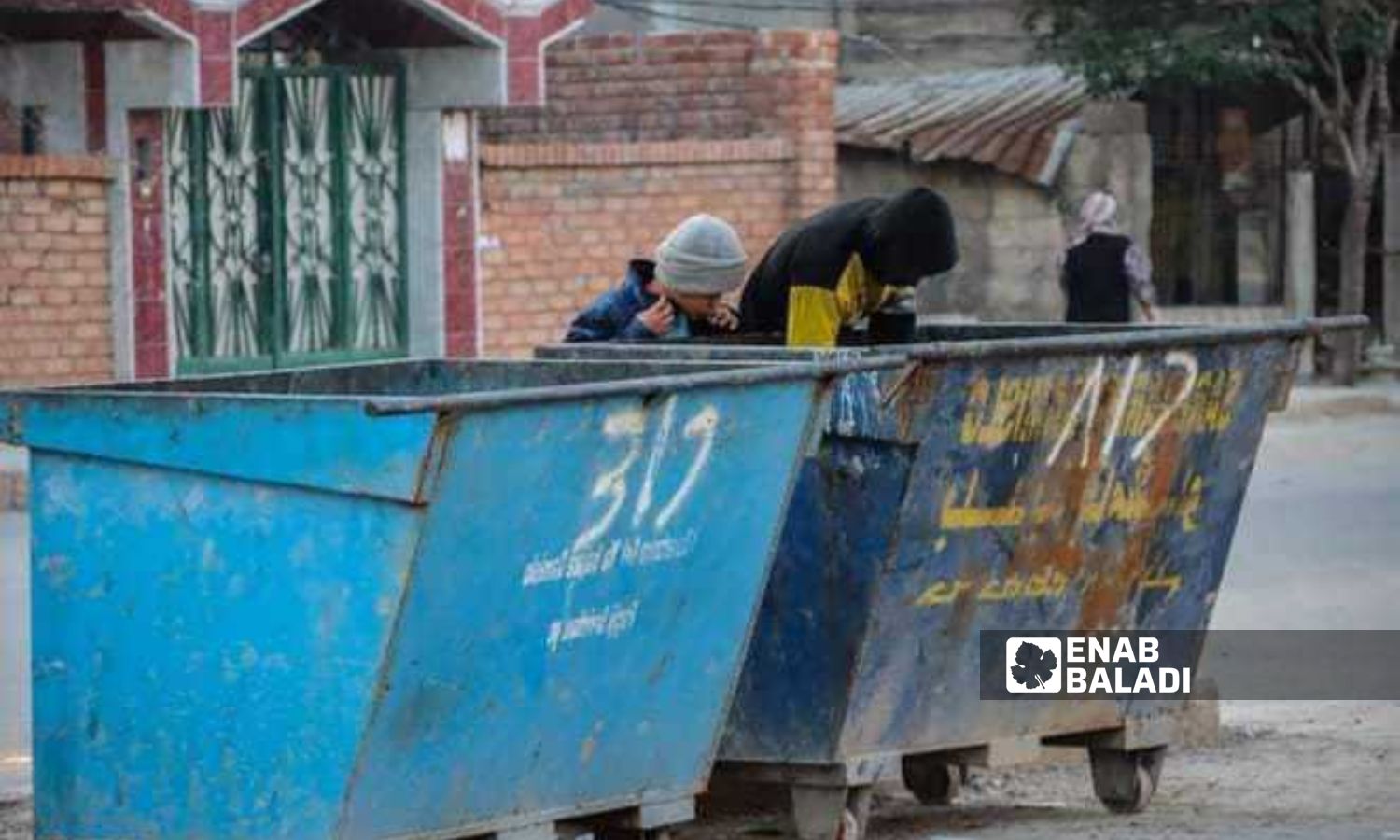



Al-Hasakah – Rita al-Ahmad
Young children in front of garbage containers, competing to collect materials from accumulated heaps of waste, is a recurring and daily scene in the city of al-Hasakah, northeastern Syria.
Children undertake this work in the face of rising poverty rates and the decreasing purchasing power of the Syrian pound. This work poses a danger to them due to war debris that may explode or due to skin diseases.
Raheefa al-Khudur, 55, a resident of the al-Tala’i camp in al-Hasakah (also known as the Washokani camp), told Enab Baladi that her son, Khaled, after their displacement from the city of Ras al-Ain and the difficult conditions, began working in waste digging.
Khaled searches daily for saleable materials, such as plastic, aluminum, intact glass bottles, and cardboard, as the only option after leaving their agricultural lands in their original area, which was their sole source of livelihood.
Khaled continued this work for a year and a half, wandering in the areas near the camp to collect what can be sold, then started dealing with itinerant traders known as “al-Hawaj”.
Later, he joined another group in the garbage digging work and began moving between other villages. Five months ago, al-Khudur was summoned to a hospital in al-Hasakah after her son was injured in an explosion, losing three fingers, due to playing with a bombshell that exploded in his hands.
On October 9, 2019, Turkish forces seized control of the border strip, more than 80 kilometers long and 30 kilometers deep, which includes Ras al-Ain and other Syrian villages, after nine days of battles with the Syrian Democratic Forces (SDF).
Khaled is not the only one working in a work that poses a danger to his life, as Fareeda Abdullah,14, accompanies her three siblings every morning to collect leftovers from inside the garbage containers in the Siyahi neighborhood.
They sell what they collect of plastic and other materials to waste traders and use this money to secure their basic needs.
Fareeda’s mother, whose name is Hindiya, told Enab Baladi that her daughter developed a skin rash on her hands, so she bought plastic gloves for her, but after two days, the rash spread all over her body.
Fareeda was transferred to the National Hospital in the city of Qamishli, and it turned out that she was suffering from viral skin inflammations that appeared in the form of warts due to contamination during garbage digging.
Dump digging is not limited to children, as adults also do this work, as documented by Enab Baladi.
Mukhlef Saeed, 51, works in waste digging and told Enab Baladi that this work is a source of income for many of the less fortunate.
Saeed collects large quantities of garbage, including cardboard, plastic, and metal containers, and then transports them in his small Suzuki truck, which has become an essential means for him to pursue this work.
This work largely depends on the increasing demand for recycling garbage materials, and Saeed delivers what he collects to a middleman working in the field of recycling materials.
The man receives a financial return that is the main source of income for his family amid the difficult economic conditions faced by many in Syria.
Waste picking causes health damage to children, specifically skin diseases.
Kifa Elias, a dermatologist in al-Hasakah province, spoke to Enab Baladi about the danger of garbage digging inside containers or at landfills.
The doctor mentioned that continuous work exposes children to many diseases due to inhaling fermentation gases, exposure to polluted air, and other harmful factors.
Elias warned against children not wearing personal protective equipment, especially if their bodies have wounds, as skin diseases can be transmitted directly through their blood.
She also emphasized the importance of raising awareness among children about the necessity of wearing protective clothing and shoes for protection, in addition to avoiding direct contact with waste.
Garbage contains various harmful substances such as bacteria, viruses, and toxic chemicals, and when a child’s skin is exposed to these substances, allergic reactions, skin irritation, and bacterial or viral infections may occur.
Some common skin diseases that may result from contact with garbage include skin inflammations, skin rashes, and food poisoning, according to Elias.
Scavenging is the process of searching for and collecting recyclable or reusable materials from garbage.
Individuals participating in this process are known as waste pickers and are often people living in difficult economic conditions who rely on collecting recyclable materials from garbage to make a living.
A center was previously opened in the village of Khazna in the city of Qamishli to care for homeless children and prevent their exploitation in activities that negatively affect their health and bodies.
This center is supported in cooperation between humanitarian organizations, the local administration and environment authority affiliated with the Autonomous Administration of North and East Syria (AANES) and its work mechanism is coordinated with the municipal police.
Children are transported to the reception center, and there, parents undertake to protect their children from these dangerous phenomena.
In the event of repetition of the guardians’ violations of their undertakings, the child is transferred to a care home in the village of Khazna.
There are no precise figures for the number of children working in waste digging in AANES areas.
if you think the article contain wrong information or you have additional details Send Correction